CDK4/6 inhibition confers protection of normal gut epithelia against gemcitabine and the active metabolite of irinotecan
- PMID: 37266562
- PMCID: PMC10361147
- DOI: 10.1080/15384101.2023.2217003
CDK4/6 inhibition confers protection of normal gut epithelia against gemcitabine and the active metabolite of irinotecan
Abstract
Cancer chemotherapy relies on a high ratio of toxicity toward cancer cells vs. nonmalignant cells, making it desirable to protect normal cells. Among the nonmalignant cells, epithelia of the gut belong to the most vulnerable ones toward chemotherapeutics. Here, we use a murine intestinal organoid model to assess a strategy for protecting such epithelia against chemotherapy. Cell cycle progression was first stalled by palbociclib, a clinically established cyclin-dependent kinase 4/6 (CDK4/6) inhibitor. Washout of the drug allowed subsequent outgrowth of gut organoids. This transient cell cycle arrest conferred near-complete protection of the cells toward the nucleoside analogue gemcitabine. Moreover, pre-treatment with palbociclib protected the organoids against SN-38, the topoisomerase I-inhibiting metabolite of irinotecan, which is otherwise known for its severe gastrointestinal toxicities. In contrast, RB1-mutated cancer cells were not protected against gemcitabine or SN-38 when pre-treated with palbociclib. Taken together, these results outline a strategy for protecting nonmalignant cells against the toxicities of chemotherapeutics commonly used to treat advanced colorectal and pancreatic cancer. We propose that this strategy is particularly promising to protect the gut when treating RB1-deficient tumors that fail to arrest the cell cycle in response to CDK4/6 inhibitors. [Figure: see text].
Keywords: CDK4/6; cyclotherapy; gemcitabine; intestinal organoids; irinotecan; palbociclib.
Conflict of interest statement
No potential conflict of interest was reported by the authors.
Figures

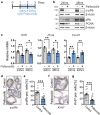
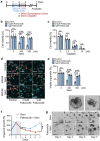
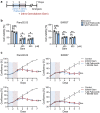
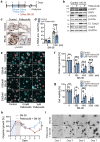
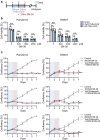

Similar articles
-
Combination of cyclin-dependent kinase and immune checkpoint inhibitors for the treatment of bladder cancer.Cancer Immunol Immunother. 2020 Nov;69(11):2305-2317. doi: 10.1007/s00262-020-02609-5. Epub 2020 Jun 6. Cancer Immunol Immunother. 2020. PMID: 32506263 Free PMC article.
-
Biological specificity of CDK4/6 inhibitors: dose response relationship, in vivo signaling, and composite response signature.Oncotarget. 2017 Jul 4;8(27):43678-43691. doi: 10.18632/oncotarget.18435. Oncotarget. 2017. PMID: 28620137 Free PMC article.
-
Clinical Management of Potential Toxicities and Drug Interactions Related to Cyclin-Dependent Kinase 4/6 Inhibitors in Breast Cancer: Practical Considerations and Recommendations.Oncologist. 2017 Sep;22(9):1039-1048. doi: 10.1634/theoncologist.2017-0142. Epub 2017 Jul 13. Oncologist. 2017. PMID: 28706010 Free PMC article. Review.
-
Sustained mTORC1 activity during palbociclib-induced growth arrest triggers senescence in ER+ breast cancer cells.Cell Cycle. 2021 Jan;20(1):65-80. doi: 10.1080/15384101.2020.1859195. Epub 2020 Dec 28. Cell Cycle. 2021. PMID: 33356791 Free PMC article.
-
Progress of CDK4/6 Inhibitor Palbociclib in the Treatment of Cancer.Anticancer Agents Med Chem. 2018;18(9):1241-1251. doi: 10.2174/1871521409666170412123500. Anticancer Agents Med Chem. 2018. PMID: 28403773 Review.
Cited by
-
Enhancement of colorectal cancer therapy through interruption of the HSF1-HSP90 axis by p53 activation or cell cycle inhibition.bioRxiv [Preprint]. 2024 Feb 26:2024.02.22.581507. doi: 10.1101/2024.02.22.581507. bioRxiv. 2024. PMID: 38464125 Free PMC article. Preprint.
References
-
- Kranz D, Dobbelstein M. Nongenotoxic p53 activation protects cells against S-phase-specific chemotherapy. Cancer Res. 2006;66:10274–10280. - PubMed
-
- Carvajal D, Tovar C, Yang H, et al. Activation of p53 by MDM2 antagonists can protect proliferating cells from mitotic inhibitors. Cancer Res. 2005;65:1918–1924. - PubMed
Publication types
MeSH terms
Substances
Grants and funding
LinkOut - more resources
Full Text Sources
Miscellaneous
